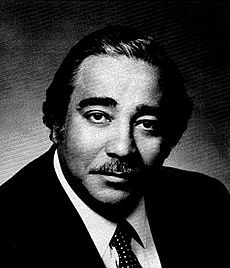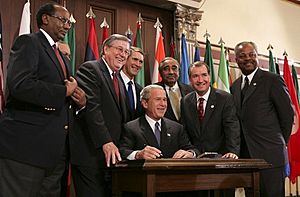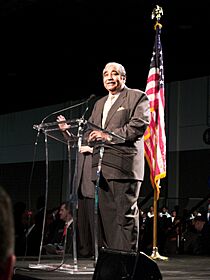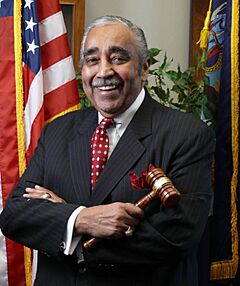Charles Rangel facts for kids
Quick facts for kids
Charles Rangel
|
|
|---|---|
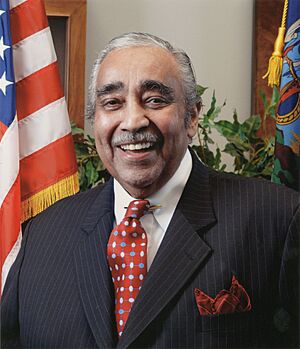
Official portrait, 2013
|
|
| Member of the U.S. House of Representatives from New York |
|
| In office January 3, 1971 – January 3, 2017 |
|
| Preceded by | Adam Clayton Powell Jr. |
| Succeeded by | Adriano Espaillat |
| Constituency |
|
| Chair of the House Ways and Means Committee | |
| In office January 3, 2007 – March 3, 2010 |
|
| Preceded by | Bill Thomas |
| Succeeded by | Sander Levin |
| Member of the New York State Assembly from the 72nd district |
|
| In office January 1, 1967 – December 31, 1970 |
|
| Preceded by | Bill Green |
| Succeeded by | George Miller |
| Personal details | |
| Born |
Charles Bernard Rangel
June 11, 1930 New York City, U.S. |
| Died | May 26, 2025 (aged 94) New York City, U.S. |
| Political party | Democratic |
| Spouse |
Alma Carter
(m. 1964; died 2024) |
| Children | 2 |
| Education | |
| Signature |  |
| Military service | |
| Allegiance | United States |
| Branch | |
| Service years | 1948–1952 |
| Rank | Staff Sergeant |
| Unit | 503rd Artillery Battalion, 2nd Infantry Division |
| Battles/wars |
|
| Awards |
|
Charles Bernard Rangel (June 11, 1930 – May 26, 2025) was an American politician. He served as a U.S. Representative for districts in New York City for 46 years. He was a member of the Democratic Party. When he retired in 2017, he was one of the longest-serving members of the House of Representatives.
Rangel was born in Harlem, New York. He earned a Purple Heart and a Bronze Star for his brave service in the United States Army during the Korean War. He led soldiers to safety during a dangerous battle in 1950. After the war, he graduated from New York University and St. John's University School of Law. He worked as a lawyer and served in the New York State Assembly. In 1970, he was elected to the U.S. House of Representatives.
In Congress, Rangel quickly became an important leader. He was the first African American to chair the powerful House Ways and Means Committee. He also helped create the Congressional Black Caucus, a group of African American members of Congress. Rangel was known for his strong views and friendly personality. He worked to improve life in Harlem. He retired from Congress in January 2017 and passed away in May 2025.
Contents
Early Life and Military Service
Charles Rangel was born in Harlem, New York City, on June 11, 1930. His father was from Puerto Rico, and his mother was African American from New York City. Charles was one of three children. His father left the family when Charles was young. His mother worked hard as a maid and seamstress to raise the family. Charles also spent summers in Accomac, Virginia, where his mother's family lived.
Charles did well in elementary and middle school. He started working at a local drug store when he was eight. He went to DeWitt Clinton High School but often skipped classes. His grandfather, who worked in a courthouse, helped keep him out of serious trouble. Charles left high school at 16 and worked in various low-paying jobs.
Serving in the Korean War
In 1948, Rangel joined the United States Army and served until 1952. During the Korean War, he was an artillery specialist in the 503rd Field Artillery Battalion. His unit was part of the 2nd Infantry Division. At this time, most military units were still segregated by race.
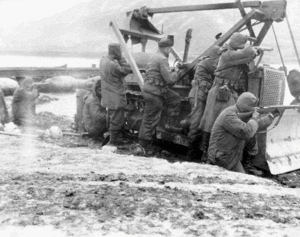
In November 1950, Rangel's unit faced heavy fighting in North Korea. They were part of a U.N. retreat from the Yalu River. During the Battle of the Ch'ongch'on River, his division was ordered to hold a road near Kunu-ri. This allowed other U.S. forces to retreat. On November 29, the Chinese Army attacked and surrounded the 2nd Infantry. Rangel later described it as a "waking nightmare."
On November 30, Rangel was in a group of vehicles that was trapped and attacked. He was hit by shrapnel from a Chinese shell. Despite his fear, Rangel, who was called "Sarge" by his unit, led about 40 men over a mountain. They escaped the Chinese forces. Many others were lost due to the harsh conditions. By December 1, Rangel's group reached safety.
Rangel was treated in a hospital and later returned to duty. He was sent back to the U.S. in July 1951. He received a Purple Heart for his injuries and a Bronze Star with Valor for his bravery. His unit also received special awards. Rangel often said that after surviving Kunu-ri, he "never, never had a bad day."
Education After the War
After leaving the Army as a staff sergeant in 1952, Rangel returned home. He finished high school, completing two years of study in one year. Thanks to the G.I. Bill, which helps veterans with education, he attended New York University. He earned a Bachelor of Science degree in 1957. He then received his law degree from St. John's University School of Law in 1960 on a full scholarship.
Early Career and Entry into Politics
After law school, Charles Rangel became a lawyer. He worked for a well-known Black law firm. He also served as an Assistant U.S. Attorney. He later worked as a legal advisor for various government groups. His interest in politics grew during these years.
In 1964, Rangel helped form the John F. Kennedy Democratic Club in Harlem. He also took part in the 1965 Selma to Montgomery marches, which were important for civil rights.
New York State Assembly
In 1966, Harlem Democrats chose Rangel to run for the New York State Assembly. He won and served from 1967 to 1971. He became a leader among Black lawmakers in New York.
Election to Congress
In 1970, Rangel decided to run for the U.S. House of Representatives. He challenged the long-serving Congressman Adam Clayton Powell Jr.. Powell was a famous and colorful figure, but he had faced ethics issues. Rangel focused on Powell's frequent absences from Congress.
In the primary election, Rangel defeated Powell by a very small number of votes. Powell tried to challenge the results but was unsuccessful. With support from both Democrats and Republicans, Rangel easily won the general election in November 1970.
U.S. House of Representatives
Charles Rangel was re-elected every two years until he retired. He usually won with a very high percentage of the votes. His district's boundaries and numbers changed over the years. It was the 18th, 19th, 16th, 15th, and finally the 13th District. Over time, the district became more diverse, with a growing Hispanic population.
Key Roles and Committees
Rangel was a founding member of the Congressional Black Caucus in 1971. He served as its chairman from 1974 to 1976. He remained an active member throughout his time in Congress.
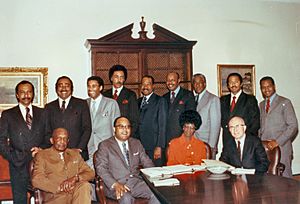
One of Rangel's most important roles was on the Committee on Ways and Means. This committee handles tax laws and other important financial matters. He joined it in 1975. He became its chairman in 2007, making him the first African American to hold this powerful position. He also chaired the Select Committee on Narcotics Abuse and Control from 1983 to 1993.
Rising Influence in the 1970s and 1980s
As a new representative, Rangel quickly gained influence in the House. He was known for his political skills and hard work. He was also good at finding compromises. He worked with members from both parties. In 1974, he became the first African American on the Ways and Means Committee. By 1979, he chaired its health subcommittee.
By the late 1970s, Rangel was a leading Black political figure in New York City. He was part of the "Gang of Four" in Harlem. This group of politicians, including Percy Sutton and David Dinkins, broke barriers for Black Americans in politics. They were very influential in Harlem for many years.
In the 1980s, Rangel continued to grow in power. He became chairman of the Ways and Means Subcommittee on Oversight. He worked to protect social spending from cuts. He also became a Deputy Majority Whip, a leadership role in the House.
Rangel was a key figure in the Tax Reform Act of 1986. This law made big changes to the U.S. tax system. Rangel successfully argued for reducing taxes for lower-income people. He also helped create the Low-Income Housing Tax Credit, which helps build affordable homes.
Rangel was a strong opponent of apartheid in South Africa. He pushed for a law that removed tax credits for U.S. companies doing business there. This law, known as the "Rangel Amendment," helped pressure companies to leave South Africa. Nelson Mandela praised Rangel for his efforts.
1990s: Challenges and Achievements
In the 1990s, Rangel continued his work. He helped create "empowerment zones" in 1993. These zones offered tax benefits to encourage investment and job creation in inner-city areas. He played a big part in the Upper Manhattan Empowerment Zone Development Corporation. This effort helped bring new life and money to Harlem.
Rangel also worked to get more African American votes for Democratic candidates. In 1998, he was one of the first to suggest that Hillary Clinton run for a Senate seat in New York. She won the election.
2000s: Protest and Leadership
In the early 2000s, Rangel supported programs to help people in need. He also sponsored the African Growth and Opportunity Act in 2000. This law encouraged trade between the U.S. and countries in Africa.
After the September 11 attacks, Rangel helped extend unemployment benefits for those affected in New York. In 2002, he started the Charles B. Rangel International Affairs Fellowship Program. This program helps more minority students work in the U.S. Foreign Service.
In 2004, Rangel was arrested for protesting human rights abuses in Sudan. He believed that when lives are in danger, people should speak out.
Rangel strongly opposed the Iraq War. He felt powerless to stop it in Congress. He also believed that the U.S. should bring back the draft (military conscription). He argued that a draft would make the military more representative of all Americans.
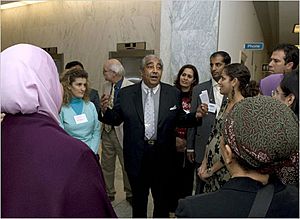
In 2007, Rangel became chairman of the House Ways and Means Committee. This was a major achievement. He was the first African American and the first New Yorker in over a century to hold this position. He was 76 years old but still worked very long hours.
Ethics Issues and Censure
Starting in 2008, Rangel faced questions about his actions. These questions were investigated by the House Ethics Committee.
Concerns Raised
Reports suggested that Rangel had used his official letterhead to ask for donations for the Charles B. Rangel Center for Public Service at City College of New York. Some of these donations came from companies that had business interests before his committee.
There were also reports that Rangel rented several apartments in Harlem at prices lower than what others paid. One apartment was used as a campaign office, which was against rules for rent-stabilized homes.
Another issue involved Rangel's vacation home in the Dominican Republic. He was accused of not reporting income from renting out this villa on his tax forms. He later paid back taxes for this.
Committee Investigation and Censure
The House Ethics Committee began a formal investigation into these matters. In March 2010, Rangel stepped aside as the Ways and Means chairman while the investigation continued.
On July 22, 2010, the Ethics Committee announced it had "substantial reason to believe" Rangel had broken ethics rules. On July 29, he was formally charged with 13 violations. Rangel said he had not intentionally done anything wrong.
On November 16, 2010, the committee found Rangel guilty of 11 charges. These included improperly asking for donations, misusing House resources, and not reporting all his income. The committee recommended that the full House censure him. Censure is a very serious punishment, just below being removed from Congress.
On December 2, 2010, the House of Representatives voted 333–79 to censure Rangel. He was only the 23rd House member in history to be censured. Rangel stood in the well of the House as the Speaker read the formal censure. He said, "I know in my heart I am not going to be judged by this Congress. I'll be judged by my life in its entirety."
Final Years in Congress
After the censure, Rangel lost his chairmanship when Republicans took control of the House in 2011. Despite his difficulties, he remained a respected figure.
In 2011, Rangel supported the Occupy Wall Street movement. He visited their protest site in New York City.
In 2012, Rangel faced a tough re-election campaign. His district boundaries had changed, and it was now mostly Hispanic. He won a very close primary election against State Senator Adriano Espaillat. He then won the general election easily.
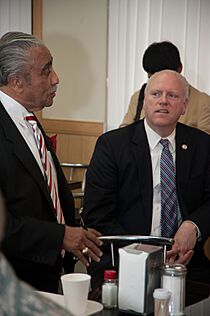
Rangel tried to overturn his censure in court, but judges said they could not interfere with the House's internal actions.
In 2014, Rangel ran for re-election again, promising it would be his last term. He again faced Espaillat in the primary and won. He then won the general election.
As he had promised, Rangel did not run for re-election in 2016. He supported an African American candidate to succeed him. However, Adriano Espaillat won the primary and then the general election. Espaillat became the first non-African American to represent Harlem in the House in many decades. Rangel left office on January 3, 2017.
Later Years and Death
After retiring from Congress, Charles Rangel remained active in public life. He gave interviews and commented on the future of Harlem. He supported various political candidates.
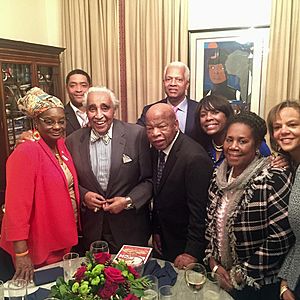
He served as a statesman-in-residence at the City College of New York. The school's Charles B. Rangel Center for Public Service is named in his honor. In 2022, a new initiative was started at City College to help increase jobs related to infrastructure in upper Manhattan and the Bronx.
Rangel's wife, Alma, passed away in September 2024. She was also active in community work, including helping create Alma Rangel Gardens, a housing unit for seniors in Harlem.
Charles Rangel died on May 26, 2025, at the age of 94, in Harlem. Many important Democratic Party figures shared tributes to him. New York Governor Kathy Hochul ordered flags to fly at half-staff in his honor.
His funeral services included public viewings at St. Aloysius Church and New York City Hall. He was the first person to lie in state at New York City Hall since 2003. Many politicians, including Hillary Clinton and former President Bill Clinton, spoke at ceremonies honoring him. His funeral was held at St. Patrick's Cathedral. Members of the South Korean National Assembly also proposed a resolution to honor him for his service in the Korean War.
Political Views
Charles Rangel was known for his liberal political views. Groups that rate politicians' votes often gave him high scores for supporting liberal policies.
For example, he typically received very high ratings from the American Civil Liberties Union and the National Association for the Advancement of Colored People. These ratings show his support for civil rights and social justice.
On the other hand, groups like the National Right to Life Committee gave him very low ratings. Organizations focused on reducing government spending, like the National Taxpayers Union, also typically gave him low scores.
Political Style
Rangel was known for being energetic, friendly, and sociable. He used his charm, humor, and honesty to build friendships and influence others in Congress. Many people in Washington, D.C., called him "Charlie." He was skilled at getting others to agree with him, even if it meant changing their minds. Lobbyists even had a term called "Rangeling" for his way of using humor to make a point.
He was very dedicated to politics and had few hobbies outside of it. He was also known for speaking his mind directly. For example, after Hurricane Katrina in 2005, he criticized the slow government response. He sometimes made strong comparisons, which led to public disagreements with figures like Vice President Dick Cheney.
Rangel was also very proud of his home state and city, New York. He sometimes made comments that caused controversy, but he would often apologize later. When his ethics issues became public, he continued to speak bluntly.
Awards and Honors
Charles Rangel received many awards for his work. The Congressional Black Caucus Foundation gave him several Phoenix Awards, including a Lifetime Distinguished Service Award in 2003.
He also received the Jackie Robinson Foundation's Lifetime Achievement Award in 2005. In 2006, he was given the Distinguished Service Award from the Washington International Trade Association.
Rangel received many honorary degrees from universities, including Hofstra University and Syracuse University. In 2006, he received a Presidential Medal from Baruch College.
See also
 In Spanish: Charles B. Rangel para niños
In Spanish: Charles B. Rangel para niños
 | Delilah Pierce |
 | Gordon Parks |
 | Augusta Savage |
 | Charles Ethan Porter |


